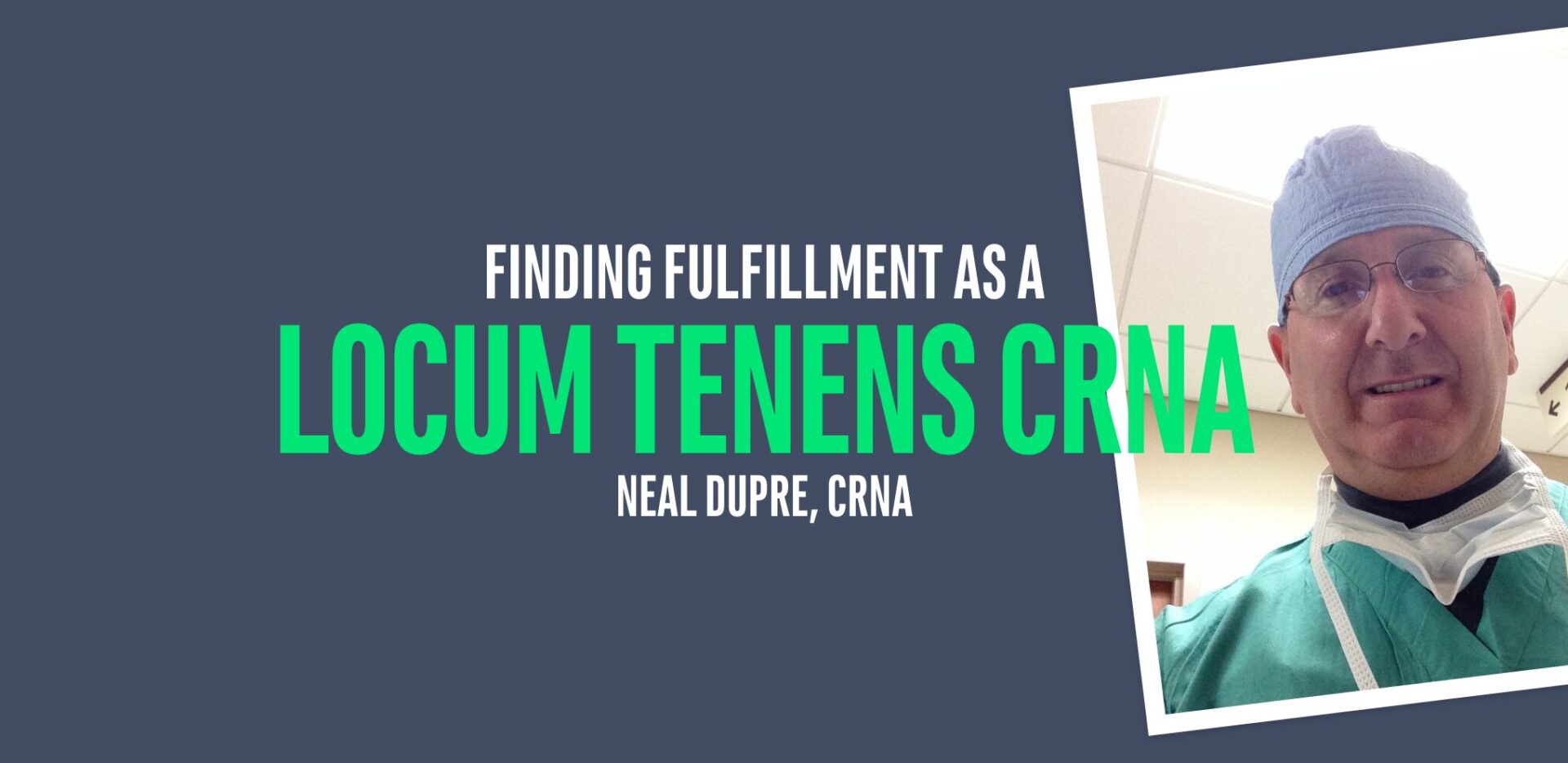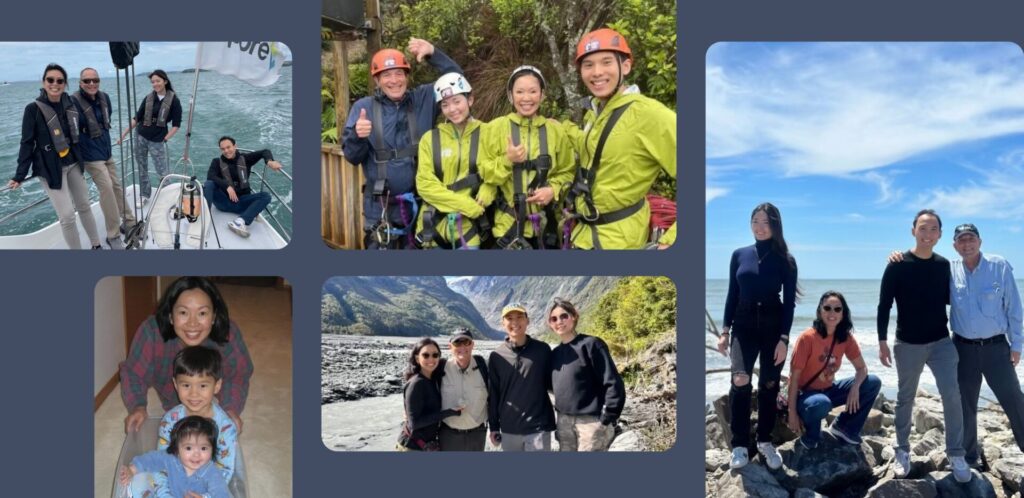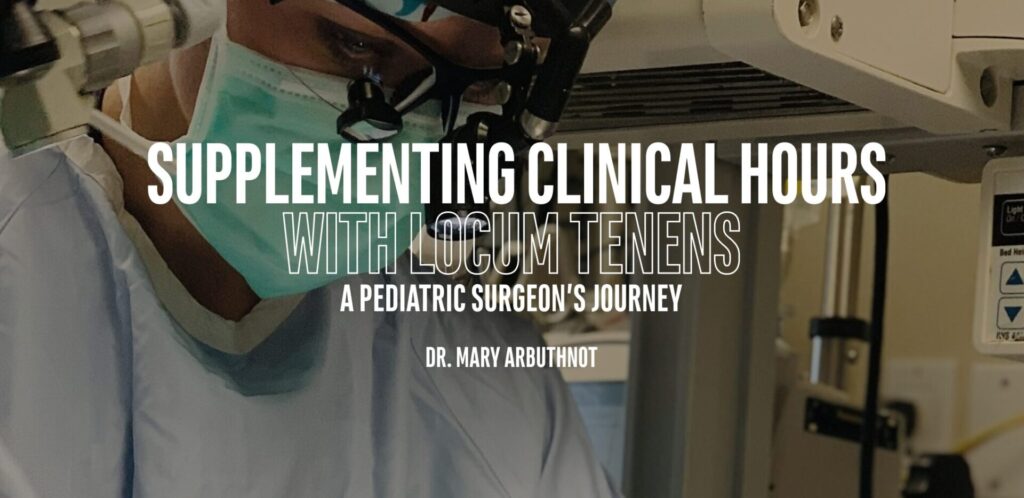It’s CRNA Week: a time to recognize the professionals who work hard every day to ensure their patients receive the best care possible in every surgical setting.
This week, we’re highlighting Neal Dupre, who has worked as a locum tenens CRNA for over twenty years. We sat down with him to talk about how he decided to pursue CRNA locums jobs full-time, what tools a CRNA needs to succeed in every environment, and what he wishes more people understood about CRNA work.
Here’s what he had to say:
What led you to become a CRNA?
Growing up, my mother was a nurse, and she always had her books around the house. I enjoyed science and biology, so I would refer to her books and learn about the different physiology of the heart in the lung. She was a recovery room nurse, so she was the one who told me about the CRNAs that she worked with, and suggested that it would be a good profession for me to go into.
I got to meet some of the CRNAs she worked with, and eventually I decided this was what I wanted to do with my life. I was in high school at the time, and we were all discussing what we wanted to be, and two of my friends ended up deciding they wanted to do exactly the same thing. So we all went in at the same time.
How did you decide to start working as a locum tenens CRNA?
I was working out of my hometown in Louisiana, and I was a 1099 employee at that particular post. So I had already set up my liability insurance and my retirement accounts. But when I started having a family, I ended up taking a W2 job. Pretty soon, I realized that even though I was working hard, most of the anesthesiologists I was working with had a lot more time off, and made a lot more money.
So I decided to go back to doing locum tenens, and that led to me ultimately becoming a full-time independent locum tenens CRNA. And I never looked back.
When I started doing locums, there were probably only about a half dozen agencies out there. But I just kept at it. I was able to be home on the weekends with my boys and my wife and I decided that being able to control my own retirement and my own health insurance meant a lot more to me than being in a full-time position. I wanted to have that control.
There were sacrifices: you don’t get that six weeks paid vacation, or sick leave, or anything like that.. But I don’t regret that one bit.
You’ve done locums for 23 years now. What has it been like working for so many different facilities?
If you look at my history, I’ve probably had about 60-75 different contracts. But some of them are repeated places. And each place has its own personality. That’s one of the things that I get out of locums.
Initially, you get a little nervous about whether you’ll be able to learn their system, or fit into their group. But as time has gone on, those worries don’t even cross my mind anymore. I’ve seen just about all the machines, all of the different scenarios, to the point where nothing surprises me too much. So the assignments get easier as time goes on. You learn to just go in and get the work done.
What are some of the other advantages of locum tenens?
One of the best things about locum tenens is making good friends in different parts of the country. I have friends in Houston, Texarkana, Dallas, Mississippi, New Orleans. All of those are great places with great people, and without locum tenens, I would not have met any of these people. So that’s definitely one of the advantages of doing locums.
As someone who has been a locum tenens CRNA for over 20 years, what impact has it had on your life?
I came from a lower middle class background. So I learned how to work. I did construction work during college to work my way through. That background set me on the road of working hard, and to overlook some of the hardships that I experienced over the years.
So probably the biggest impact locums has had on my life is being able to pull myself into a higher income level. My wife and I bought a home about five years ago, and even though it’s a 20 year old home, it’s our dream home. Now on the weekends we just get out into the yard and do landscaping and have fun together, and it is really fulfilling.
There’s a kind of a self actualization there, that I can now do the things I enjoy, and just live. I can make my yard pretty. I’ve got a place with my grandkids to play. That’s the joy I’ve gotten out of the work I put in. I feel very, very fortunate that this profession has allowed me to improve my life.
What advice do you have for CRNAs considering locums?
I have watched a lot of CRNAs come up through the years, and I’m always impressed with their knowledge. I’m impressed how they can come into an environment and just get it done.
But when I talk to them, I realize that they all have the same insecurities that I had years ago. So the advice I give to younger CRNAs is to rely on your education. I’ll discuss my experience with them, especially some of the more difficult cases, so they can learn from them. That way, when they get into those scenarios, they know they can handle them.
And I also try to tell them to get rid of their insecurities. Don’t be arrogant about it, but just do your work well and quietly. You don’t go in and be the master of all things anesthesia. You just have to take care of your cases.
What advice do you have in terms of how to prepare for going into a new operating room as a locum tenens CRNA?
Anesthesia is a lot of doing the same exact thing over and over again. When I come in in the morning, I get all my tools ready, my drugs, my intubation equipment, and make sure everything is exactly where I need them. When I need my tape, I want to go to my tape place and find my tape there. If we’re going to need to raise someone’s blood pressure, I want to know exactly where I can get that medicine. Knowing where you put things and being consistent is so important.
When you start a new assignment, you have to establish that routine which is always an adjustment. But you have to just be resilient, and ask good questions. Usually it takes you a couple of weeks before you feel comfortable. But as long as you’re open-minded and resilient, you’ll figure it out.
You also have to focus on what you’re doing. Being able to keep your mind on what you have to do is very important. People will have to ask my name two or three times if they’re trying to get my attention during surgery. There’s all kinds of small things they’ll want your attention on, and you have to be able to say wait a minute, I’m still trying to keep the patient stable.
For me, it all comes down to focus and organization. Those are the two most important things.
It’s CRNA Week. What do you wish more people understood about CRNAs?
There is so much that people don’t know about this work. Every day I go in and deal with the patients going through difficult surgeries. Over a period of time, you get into a habit where you know exactly how to get good results with them, and I’m happy to be a part of that.
But it’s hard to explain to friends who have no idea what goes on in surgery, or what you do. They don’t realize how sick people can be, and how it’s your responsibility to bring that person through a difficult surgery. We see people with heart disease, kidney disease, diabetes, and each one of those adds something difficult to the case. I don’t think people understand what we go through, and the responsibility we have to get these people through surgery.
I’m very proud of what I do. That’s the main thing I want people to understand.
*This interview has been edited for clarity and length.



